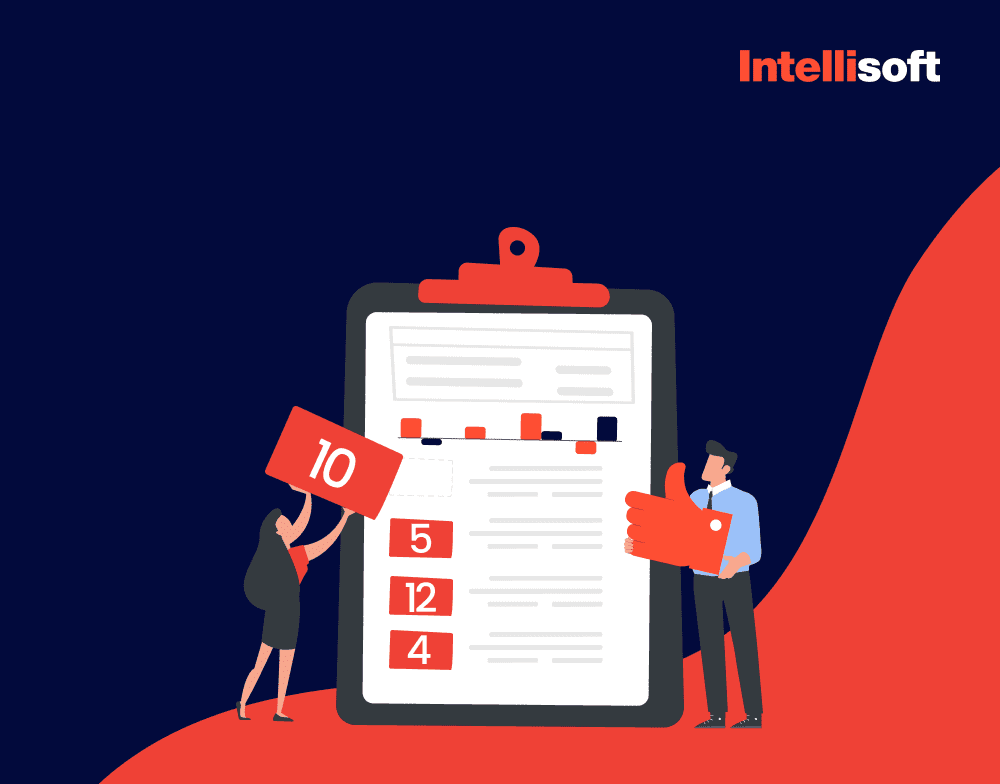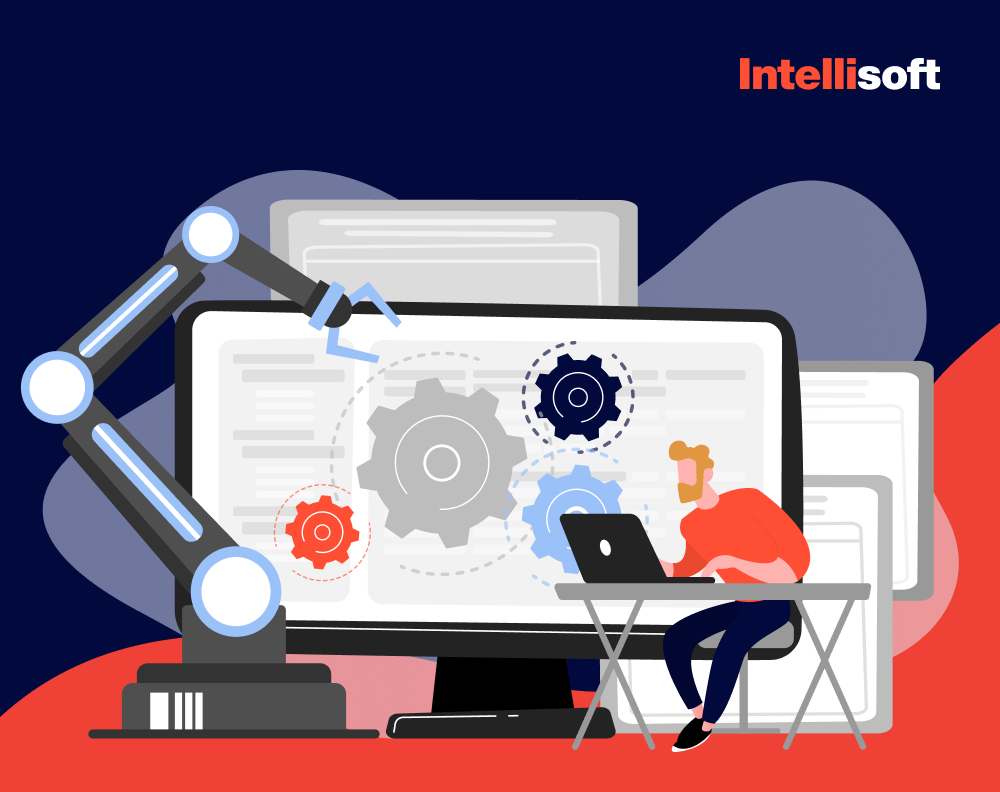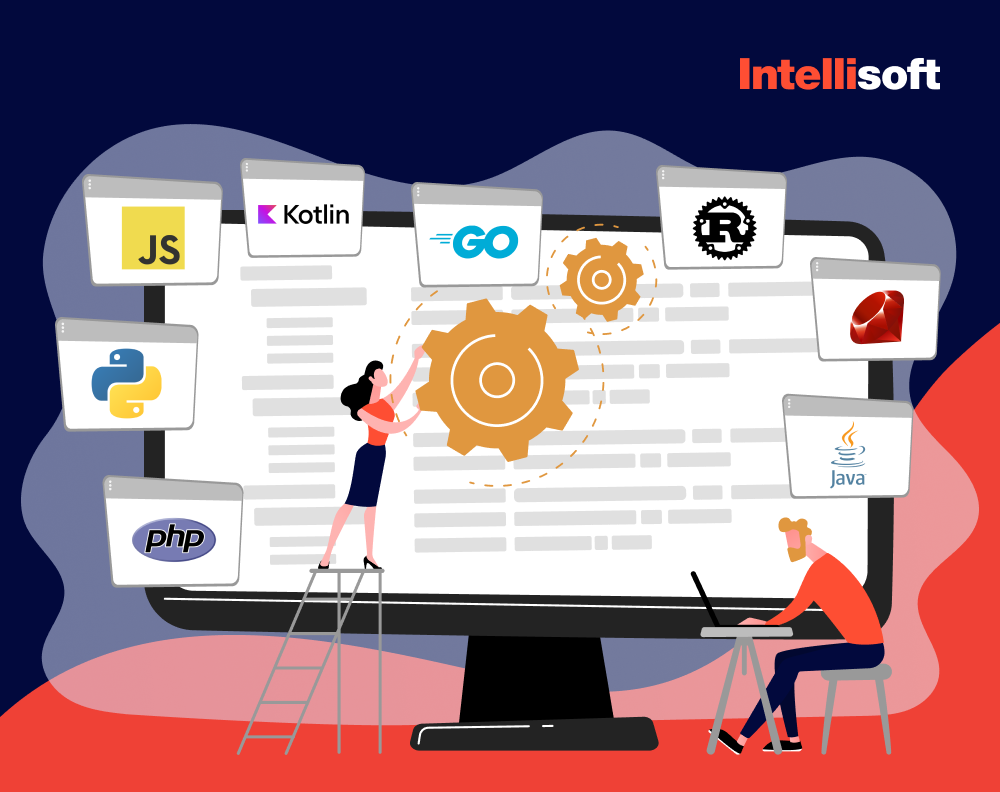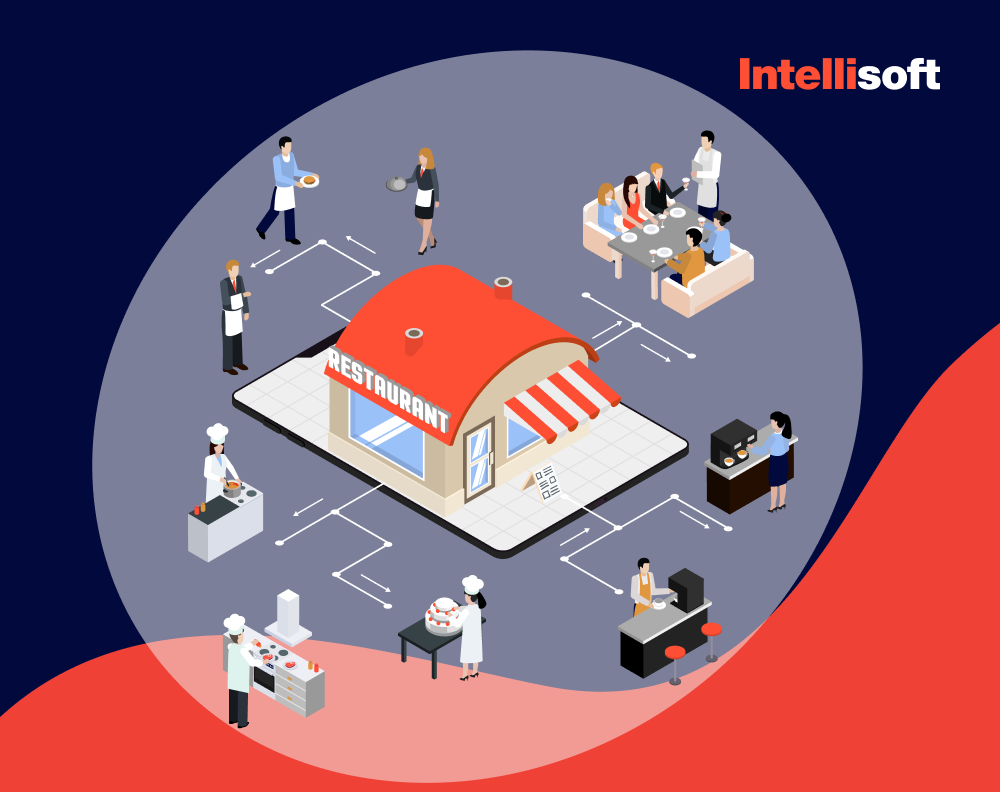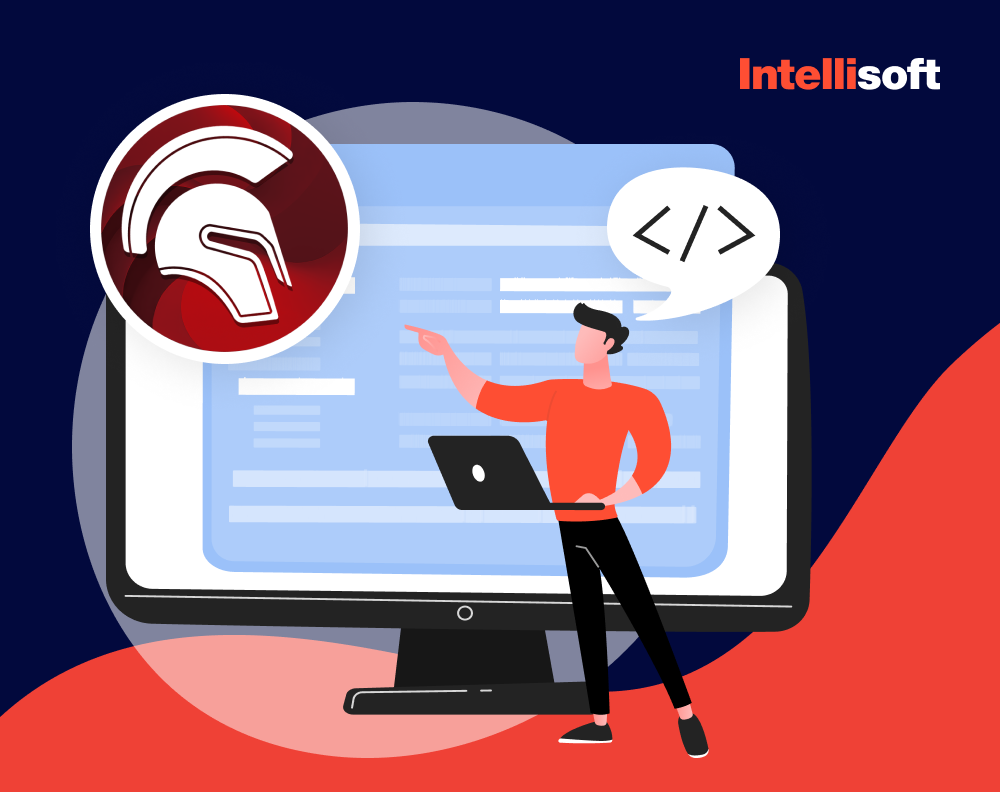The Pulse report reveals a striking statistic: only 62% of projects align with their original objectives, a mere 53% stay within budget, and just 49% are delivered on time. For enterprise software projects, such deviations can spell massive financial disasters.
Introducing the IT solution architect—the pivotal figure who bridges a company’s aspirations with the intricate technological roadmap necessary to realize them. These professionals are the guardians of project objectives, ensuring they are met without compromising on time or financial boundaries.
Solution architects wield their expertise to craft secure, reliable, cost-effective, and resilient tech infrastructures. They bridge the gap between complex business challenges and technological answers, meticulously outlining every specification needed for success.
Curious about what is a solution architect and how they differ from software engineers and project managers? Dive into this article to discover the solution architect meaning, crucial roles and responsibilities, and why they’re indispensable in today’s tech-driven business landscape.
Table of Contents
What is a solutions architect?
Before talking about the role of a solution architect, let’s figure out what solution architecture is. In short, it’s the process of designing, describing, and managing technology solutions and ensuring that they match specific business problems. Let’s say you want to find a way to protect your customers’ data – that is a business issue. To solve it, you need a solution architecture that will help you decide on the type of technology and software you should use.
What is a solutions architect? This person is the one who introduces a technical vision for a specific IT solution. It is by far one of the most significant roles in the IT industry because this person evaluates business needs and supports them with tech solutions. Architects speak both the “technical” and “business” languages with their clients, helping them merge the gap between the two.
For example, when you decide to create an app, a solution architect’s role will be to explain the options on how to build the app, what programming languages, frameworks, and APIs can be used, and approximately how much time it will take.
However, an IT solutions architect job is not done here. Next, they define the development stages and help calculate business costs. Since a solution architect knows all the components of a project and the people working on it, they can’t stand aside. Software solutions architect can also be called a project leader for this reason.
Now, let’s discuss roles and responsibilities of solution architect in detail.
What Does a Solutions Architect Do (Duties and Responsibilities)?
The solutions architect role is multifaceted and full of responsibilities. Being a project leader cannot be easy, but solution architects are masters at this. They are responsible for creating a comprehensive architecture for your specific software solution and providing strategic advice and direction throughout the development process.
With their guidance, it will be easier to achieve your business objectives and ensure the product has a scalable, secure, and maintainable architecture. But what does a solutions architect do in fact?
Duties and Responsibilities
Every technical architect roles and responsibilities are different, depending on the type of project they’re working on. Some may do more, some less, but the key duties remain similar in all cases. Let’s talk about them in detail.
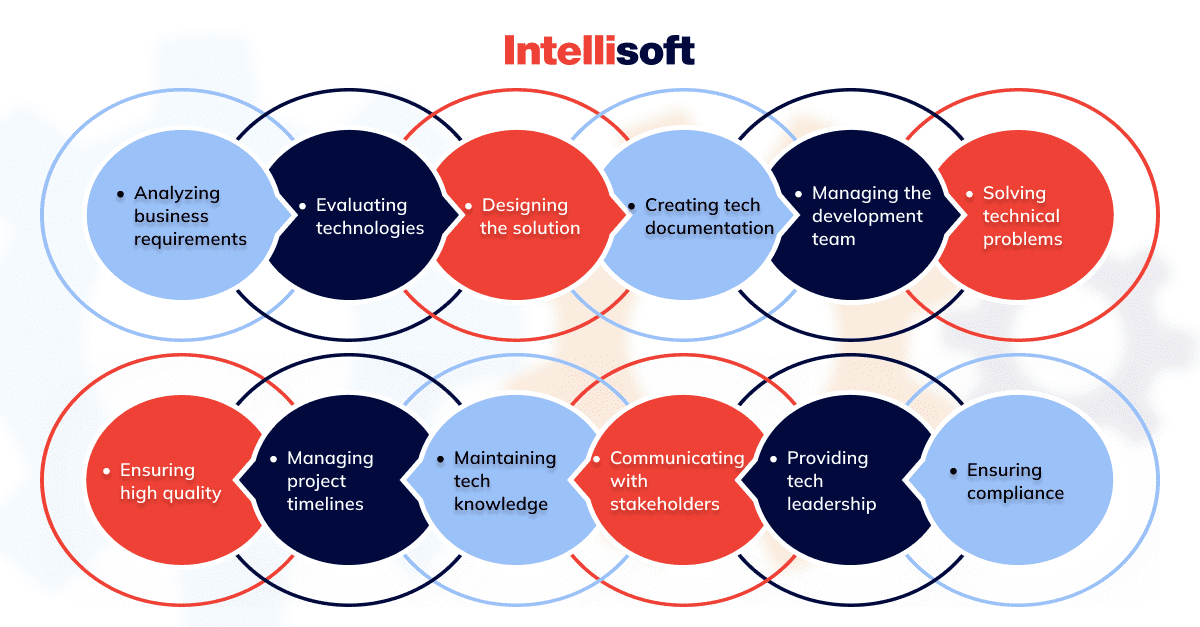
- Analyzing business requirements: First, a software solution architect must have a clear picture of the company’s requirements. They should understand where the company’s headed and its end goals. This duty involves analyzing current business processes and workflows and identifying areas of improvement where technology can help achieve better efficiency.
- Evaluating technologies: To be able to find the best solution for your case, a solution architect has to evaluate the various technologies and vendors available. They need to conduct thorough research, assess possible solutions, determine what the strengths and limitations are of certain technologies, and compare their costs. Finally, their task is to recommend which technology would be the perfect fit for your case.
- Designing the solution: Besides evaluating existing technologies, solution architects design tech solutions based on companies’ requirements. They develop technical specifications, create architectural diagrams, define the best software, choose hardware, and identify which network components to use.
- Creating tech documentation: Clear and detailed documentation is a must when designing a solution. A solution architect must create this, describe the solution and its specifications, and include diagrams, charts, and data models. Later, these documents will guide the development team through the implementation process, and stakeholders will use them to understand the technical aspects of the solution.
- Managing the development team: A solution architect’s task is to work with the development team to ensure that everything is going smoothly, the solution is implemented according to the guidelines and documentation, and that it meets the business goals. They need to collaborate closely, have clear communication, and share feedback with the team.
- Solving technical problems: An architect should also be able to troubleshoot any technical issues arising during development. This is where communication with the team enters the game – an architect should collaborate with them on finding the solution for each tech problem.
- Ensuring high quality: The solution offered by the architect should be of the highest quality and demonstrate excellent performance, speed, and scalability. To ensure this, architects test the solution and validate it regularly.
- Managing project timelines: The next duty of a software solution architect is to ensure that the solution is delivered on time and within budget. This is why they should collaborate with project managers to manage timelines. This process also involves identifying risks and problems that can arise, and finding solutions for them beforehand.
- Maintaining tech knowledge: Technology is constantly evolving, and trends in the market change, so it’s the architect’s task to stay up to date with the latest news and trends and continuously learn about new technologies. Architects should attend training sessions and conferences and maintain their knowledge through reading various publications and studies.
- Communicating with stakeholders: Besides communicating with the in-house team, architects should also communicate with the stakeholders about the details of the solution. The stakeholders may include end-users, business owners, or investors. The architect’s task is to explain complex technical information in a simple manner so that all stakeholders can understand it easily.
- Providing tech leadership: Since these specialists are the technical leaders in an organization, the role of solution architect is to guide others and set technical standards. They should ensure that everyone from the tech team has enough skills and expertise, understand their task clearly, and that the company is using technology in the most efficient way.
- Ensuring compliance: The solution must be compliant with the latest regulations and requirements. It should be secure, protect user data, and meet all industry-specific regulations. Thus, a technical solution architect should collaborate with the compliance and legal teams to make sure that the solution is designed according to regulations.
Solution architect types
There’s not just one type of solution architect; there are a lot of them, depending on the area of expertise. The most common types include:
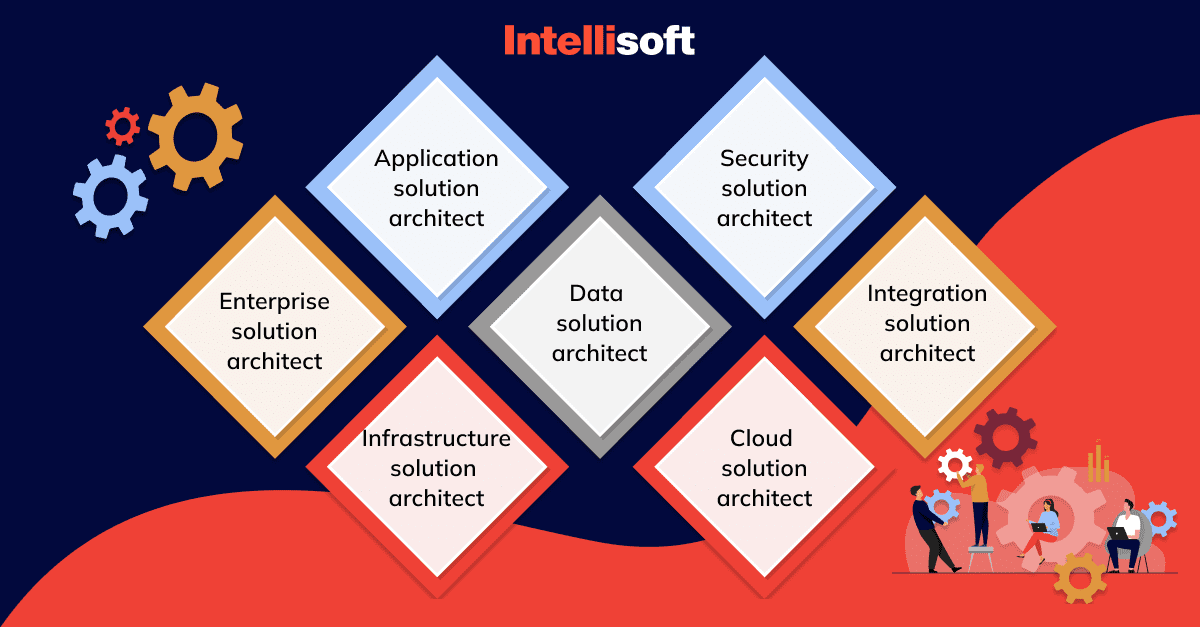
- Enterprise solution architect: An enterprise architect focuses on building enterprise ecosystems and solving high-level strategic problems. This architect works with business leaders and stakeholders, helping them define business goals and design solutions that align with these goals.
- Enterprise architect vs solution architect: Unlike regular solution architects who only define how to solve an issue, enterprise architects define exactly what has to be done. An enterprise architect has the full picture of the enterprise’s current state of architecture and builds strategic plans for implementing technical changes.
- Application solution architect: This type of architect focuses on designing and implementing solutions for apps. Technical architect roles and responsibilities remain the same: They collaborate with the development team, project managers and stakeholders to identify the best-fitting solutions. They also help the team select software design patterns, define software architecture, and make sure that the system is reliable and scalable.
- Infrastructure solution architect: An IT solution architect focuses on a corporate on-premises server or the organization’s cloud systems. An infrastructure architect helps maintain the production of a corporate software system, not the software development itself. These experts evaluate current IT systems and explore new ones. When adding new networks and systems, architects ensure they are resilient, secure, and perform well.
- Data solution architect: Data solution architects design and implement data management and analysis solutions. This person needs to understand business requirements for the data and ensure that it is of high quality and is governed properly.
- Security solution architect: A security solution architect is responsible for working with solutions for information security. They cooperate with security analysts, network engineers, and other stakeholders. They design solutions that protect the company’s data and systems from cyber threats.
- Cloud solution architect: The name of this architect reveals that they work with cloud-based platforms. They oversee the company’s cloud computing strategy, including cloud adoption plans, cloud management, and monitoring. They are often engaged in the legal areas of cloud computing, negotiating contracts, and working with legal and procurement departments.
- Integration solution architect: Integration solution architects design and implement solutions for system integration. This involves working with API developers, middleware engineers and other stakeholders to design and implement messaging systems and API gateways.
Core Solutions Architect Skills and Background
If you have already made up your mind and decided to hire a solutions architect, you need to know what to look for in terms of skills and background. Here’s a list of the core solution architect skills for an experienced specialist:
Technical background and experience
What is a senior solutions architect? This specialist should have a lot of experience in working with technical solutions. When looking for a person to hire, pay attention to their years of experience – eight years or more is preferable. The architect should have a technical background in IT areas, including:
- Engineering and software architecture design
- DevOps
- IT architecture, cloud development
- Business analysis
- Project and product management
Excellent communication skills
Solution architects cooperate with development teams, stakeholders, and other company employees, so excellent communication skills are a must. They need to know how to work with different people, negotiate, understand client needs and requirements, and explain technical information in easy terms to non-technical people. When looking for a software solutions architect, always pay attention to their soft skills, making sure that this person can listen, empathize, and explain.
Great analytical skills
Without analytical skills, a business solution architect won’t be able to understand how different parts of your business work together. Since one of the architect’s main responsibilities is to define how a company can achieve its strategic goals, they need to be able to analyze the corporate strategy, collect insights, and find possibilities for growth. Moreover, an architect’s work involves data analytics and constantly switching between different business levels.
Project and resource management skills
Solution architects should also be great managers. Even though they are not involved in project management directly, they still need to be able to manage people, deadlines, and resources. It’s their job to decide which solutions are beneficial for the company at any given moment, and how to implement them without wasting too much time or money. Moreover, solutions architects must always focus on the end goals and find ways to achieve them, considering the company’s budget and timeframes.
Benefits of Having a Solutions Architect in a Company
A solutions architect can be the magic ingredient you’ve been looking for all this time. When you find your perfect solutions architect, you will see how they benefit your business in the long run. Here are the main benefits of having a solutions architect on your team:
- Linking technologies with business needs. With a solutions architect, you don’t have to worry that the solution won’t meet your business needs and requirements. An SA will eliminate this risk forever.
- Helping with estimation and costs. A solution architect will over-see the costs and resources while meeting the stakeholder’s requirements. They will help with budget forecasting and resource planning and find areas requiring fewer investments.
- Bringing in technical and non-technical specialists together. An architect will be a bridge between your technical and non-technical specialists, helping them communicate on the same level and understand each other. An SA will notify stakeholders about the goals, development process, estimates, costs, etc. This person will be a translator, explaining technical aspects in clear language.
- Helping with risk management. Software development always has some degree of risk. The solution architect should identify these risks and find ways to mitigate them by testing performance, user experience, security, and other metrics. Moreover, solution architects eliminate factors that may affect a solution’s delivery.
- Selecting the project tech stack. It’s easy to get lost in the ocean of different programming languages, frameworks, libraries, and tools. A solution architect will be your guide in selecting the tech stack and ensuring that all the tools and technologies work flawlessly together.
Related Readings
- 12 Benefits of Outsourcing IT Support Services for Businesses
- Who Does What? Understanding Roles in a Software Development Startup
- Become a Master of Tech Due Diligence: a Comprehensive Guide
- Why Does Your Tech Start-up Need a Business Plan and How to Create One?
- Most Effective Ways to Extend Your Software Development Team
Solution Architect Certification
What is a solutions architect certification? It’s the tool that validates the specialist’s expertise. There are several professional certifications available that help validate a solutions architect’s skills and knowledge. These certifications, such as AWS Certified Solutions Architect – Associate or Microsoft Certified: Azure Solutions Architect Expert, ensure that the architect possesses the necessary skills to design and deploy complex solutions using popular cloud platforms.
Obtaining such certifications demonstrates a solutions architect’s commitment to staying up-to-date with the latest industry best practices and technologies. Employers often prefer candidates with these certifications, as they provide a level of assurance that the architect has the necessary skills to excel in their role.
Furthermore, these certifications not only validate technical skills but also demonstrate a solutions architect’s ability to understand business requirements and translate them into effective technical solutions. The process of preparing for these certifications often involves hands-on experience with cloud platforms, which enhances the architect’s practical knowledge and problem-solving abilities.
Moreover, holding a certification in solution architecture can open up new career opportunities and increase earning potential. Many organizations prioritize hiring certified professionals as they are seen as more reliable and capable of delivering high-quality solutions that meet business objectives.
When a Company Needs Solution Architecture Consulting?
Not every company requires the expertise of a solutions architect. However, when an organization faces complex business challenges that involve technology solutions, it may be time to engage a solutions architecture consultant. This could be due to various factors, such as outdated systems, inefficient processes, or the need to leverage emerging technologies to gain a competitive edge.
Solutions architecture consulting is particularly valuable when an organization is embarking on a large-scale digital transformation or implementing a new enterprise system. A solutions architect brings the necessary knowledge and experience to analyze the current state of the company’s technology landscape and design a robust and scalable solution that aligns with the organization’s strategic objectives.
Furthermore, solutions architecture consulting can also play a crucial role in ensuring that the proposed technology solutions are in compliance with industry regulations and standards. This is especially important in highly regulated sectors such as finance, healthcare, and government, where data security and privacy are paramount. By engaging a solutions architect, companies can mitigate risks associated with non-compliance and avoid costly penalties.
Moreover, a solutions architect can collaborate closely with cross-functional teams within an organization to ensure that the proposed technology solutions meet the needs of various stakeholders. This collaborative approach helps in fostering a culture of innovation and continuous improvement, where technology is seen as an enabler of business growth and operational efficiency.
Key Processes in Solution Architecture
When it comes to solution architecture, there are several key processes that a solutions architect typically goes through when working on a project. These processes are not only essential for the successful implementation of the solution, but they also play a crucial role in ensuring that the solution meets the needs and requirements of the stakeholders involved. Let’s define solutions architect role in this processes.
One of the first processes that a solutions architect undertakes is requirement gathering. This involves working closely with stakeholders to understand their needs and gather requirements for the solution. To achieve this, the architect conducts workshops, interviews, and thoroughly analyzes existing documentation. By doing so, they gain valuable insights into the problem at hand and can begin to formulate a plan for the solution.
Once the requirements are gathered, the architect moves on to system analysis. This process involves a detailed examination of the existing systems and processes in place. By conducting a comprehensive analysis, the architect can identify any gaps or areas for improvement. This step is crucial as it helps ensure that the solution not only addresses the current needs but also takes into account any potential future requirements.
After the system analysis, the architect proceeds to the design and planning phase. Based on the analysis conducted, the architect designs the overall solution architecture and creates a comprehensive plan for its implementation. This includes selecting appropriate technologies, defining integration points, and ensuring scalability and performance. The architect’s expertise in this phase is vital as it lays the foundation for the successful execution of the solution.
Throughout the project, effective collaboration and communication are paramount. The solutions architect collaborates closely with other stakeholders, such as project managers, developers, and business analysts. This collaboration ensures that everyone involved is on the same page and working towards a common goal. By maintaining open lines of communication, the architect can address any concerns or challenges that may arise, ultimately leading to a smoother implementation process.
Once the solution architecture is designed, the architect takes on the crucial role of overseeing its implementation and working closely with the development team. This ensures that the architectural guidelines are followed and that the solution is developed according to the specified requirements. Additionally, the architect plays a pivotal role in testing the solution to ensure its functionality and performance meet the desired outcomes.
Even after the solution is deployed, the work of a solutions architect is far from over. Ongoing support and optimization are essential to ensure the solution remains effective and efficient. The architect continues to monitor the performance of the solution, identifying areas for optimization and providing ongoing support to address any issues that may arise. This ongoing commitment ensures that the solution remains aligned with the evolving needs of the stakeholders and continues to deliver value over time.
As you can see, the key processes in solution architecture are comprehensive and multifaceted. From requirement gathering to ongoing support, each step is crucial in ensuring the successful implementation and maintenance of a solution. By following these processes diligently, solutions architects can effectively address the needs of stakeholders and deliver solutions that drive business success.
Solutions Architect Salary and Hourly Rate
Before hiring an IT solutions architect, you should know their salary and hourly rates. The figures differ based on their years of experience, location, complexity of the project, and the job title. Here’s an estimate of what is a solutions architect salary from ziprecruiter:
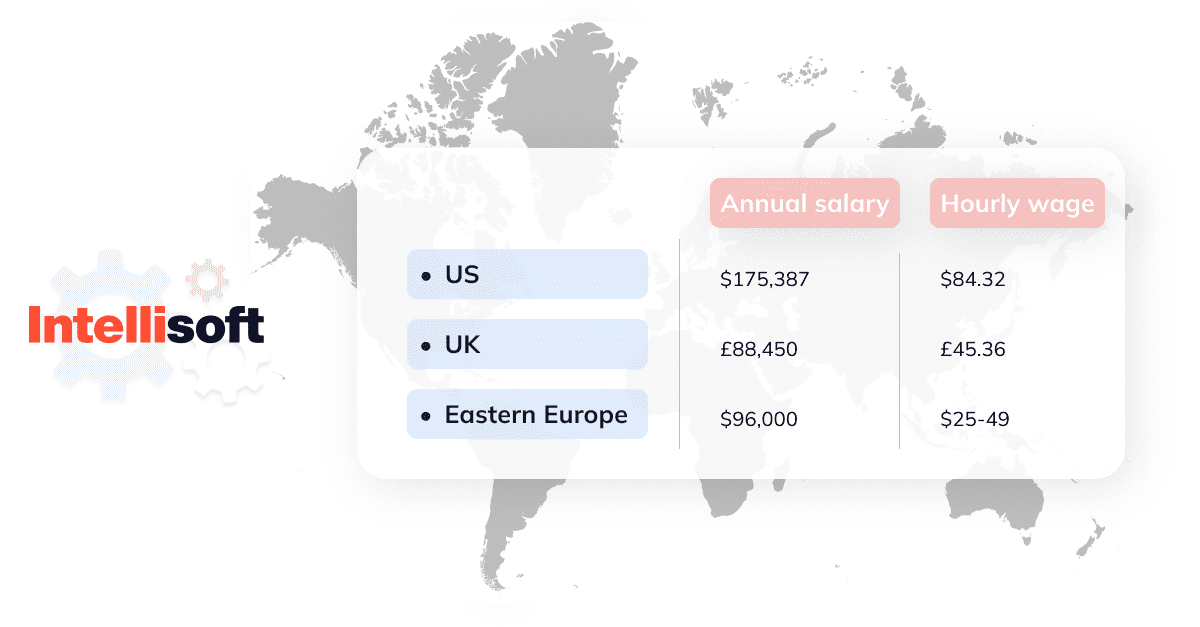
How IntelliSoft Can Help
At IntelliSoft, we know that solution architects are the secret ingredient to any business’s success. Thanks to more than ten years of experience in the industry, we have gathered a skillful team of architects who can take on even the most complex projects. Our architects are masters of their craft, working with international clients from the logistics, healthcare, EdTech, MarTech, legal, IoT, and other industries.
The list of services we offer includes product development, machine learning services, quality engineering and testing, DevOps, cloud development, data analytics, and IT support. We will be your co-pilots and guides throughout the entire process, offering our advice, support, and guidance on any questions you may have. If you want to learn more about the way we solve business challenges, check out our cases.
Conclusion
No matter the industry you’re in or the size of your company, a software solutions architect will help you bring your business to a whole new level. It may seem improbable that one person can handle so many responsibilities and tasks and play a crucial role in business success, but this is a fact. A solutions architect will find the perfect way to bring together your business needs and tech solutions to achieve your wildest business goals. If you’re ready to embark on the exciting journey of technological transformation, give us a call.




